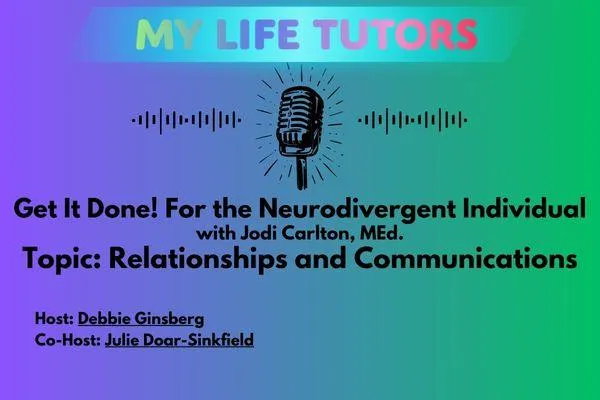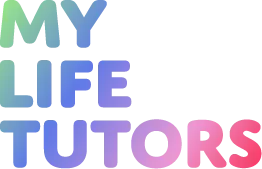My Life Tutors Blog
Learn more about our Life Tutoring services and the motivations behind our work.

Episode 4: Get It Done! For the Neurodivergent Individual with Guest Jodi Carlton, MEd. Topic: Relationships and Communications
Navigating Neurodiverse Relationships: Insights from Episode 4 of 'Get It Done for the Neurodivergent Individual'
Introduction:
In the latest episode of "Get It Done for the Neurodivergent Individual," hosts Debbie Ginsberg and co-host Julie Doar-Sinkfield invite Jodi Carlton MEd, a distinguished expert in adult autism and neurodiverse relationships. With over two decades of experience as a therapist, educator, and coach, Jodi shares her unique insights into the complexities of neurodivergent relationships. This blog post explores the key takeaways from their insightful conversation, shedding light on the challenges and effective communication strategies for individuals navigating neurodiverse connections.
Key Takeaways:
The Importance of Communication in Relationships:
Debbie and Julie emphasize the pervasive nature of relationships in our lives, underlining the need for effective communication styles.
Jodi introduces her four-stage communication model, focusing on baggage, interactions, meaning derived from interactions, and the interconnectedness of these stages.
Addressing Interpretation and Perception Issues:
Debbie suggests a practical approach to handling interpretation issues, encouraging clients to take a pause and analyze scenarios from an external perspective.
Jodi introduces the concepts of theory of mind and cognitive empathy, emphasizing the importance of understanding different perspectives for effective communication.
Initiating Conversations and Overcoming Awkwardness:
Julie discusses challenges faced by neurodivergent college students in initiating conversations and provides practical tools to bridge communication gaps.
Debbie and Jodi delve into the concept of awkwardness, exploring its roots in uncertainty about how actions will be received and the challenges of interpreting nonverbal cues.
Understanding and Addressing Alexithymia:
Debbie highlights the challenge of individuals leaning on logic rather than understanding their emotions, particularly addressing alexithymia.
Jodi connects alexithymia to sensory processing challenges and emphasizes the need for occupational therapists trained in sensory integrative treatment.
Collaborative Approach in Client Care:
Debbie and Julie stress the importance of acknowledging gaps in knowledge and referring clients to appropriate professionals.
Jodi supports the collaborative approach, emphasizing the value of building a network of professionals across disciplines and learning from clients.
Diversity in Approaches and Methods:
Julie challenges the notion that there is only one correct way to accomplish tasks, encouraging a broader perspective that embraces diversity in problem-solving.
The hosts express frustration with societal labels and advocate for acceptance and diverse perspectives in education and beyond.
Conclusion:
As the hosts wrap up Episode 4, they extend an invitation for further discussions on crucial topics related to neurodivergence. The blog post captures the essence of the insightful conversation, offering readers valuable insights into fostering understanding, communication, and support within neurodiverse relationships. If you're navigating the complexities of neurodivergent connections or seeking to enhance your understanding, this episode provides a wealth of knowledge and practical strategies. Share your thoughts and questions to continue the conversation and support the neurodivergent community.
At My Life Tutors, we accommodate and scaffold
your needs to help you realize your fullest potential.
My Life Tutors
Contact us
Hours of Operation: M-F 10 am - 5 pm EST
Other times by appointment.
Copyright @2023 by My Life Tutors
Rockfield Road
Windsor Mill, MD 21244
Serving the Continental United States
My Life Tutors
Hours of Operation: M-F 10 am - 5pm EST/1PM - 8PM PST
Rockfield Road
Windsor Mill, MD 21244
Serving the Continental United States
Copyright @2023 by My Life Tutors
#ADHDCollegeCoach #CollegeSuccess #ASDCollegeCoach
#ADHD #Autism #neurodivergent
#LifeCoach #ADHDCoach #CollegeTutor #RetentionServices #ExtendedOrientationProvider #ADHDMentor #ASDMentor #LearningDifferencesCoach #CollegeTutor
